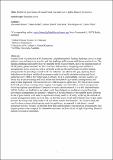Files in this item
Multilevel governance of coastal flood risk reduction : a public finance perspective
Item metadata
| dc.contributor.author | Bisaro, Alexander | |
| dc.contributor.author | de Bel, Mark | |
| dc.contributor.author | Hinkel, Jochen | |
| dc.contributor.author | Kok, Sien | |
| dc.contributor.author | Stojanovic, Tim | |
| dc.contributor.author | Ware, Daniel | |
| dc.date.accessioned | 2021-06-26T23:35:59Z | |
| dc.date.available | 2021-06-26T23:35:59Z | |
| dc.date.issued | 2020-10 | |
| dc.identifier | 268761985 | |
| dc.identifier | 45798885-37d9-4121-b127-bb9e7b1a49a0 | |
| dc.identifier | 85086900891 | |
| dc.identifier | 000571832000004 | |
| dc.identifier.citation | Bisaro , A , de Bel , M , Hinkel , J , Kok , S , Stojanovic , T & Ware , D 2020 , ' Multilevel governance of coastal flood risk reduction : a public finance perspective ' , Environmental Science and Policy , vol. 112 , pp. 203-212 . https://doi.org/10.1016/j.envsci.2020.05.018 | en |
| dc.identifier.issn | 1462-9011 | |
| dc.identifier.other | ORCID: /0000-0002-8936-2299/work/76777131 | |
| dc.identifier.uri | https://hdl.handle.net/10023/23425 | |
| dc.description | Authors acknowledge funding from the European Union's Horizon 2020 research and innovation program under Grant 642018 (GREEN‐WIN project) and funding from the project INSeaPTION as part of ERA4CS, an ERA‐NET initiated by JPI Climate, and funded by BMBF (DE), MINECO (ES), NWO (NL), and ANR (FR) with co-funding by the European Union (Grant 690462). | en |
| dc.description.abstract | Coastal flood risk reduction (CFRR) presents a significant public funding challenge, due to its high upfront costs and long-term benefits, and this challenge will increase with future sea-level rise. The funding challenge necessarily involves multiple levels of government, due to the regional nature of CFRR public goods involved. Yet there has been little research comparing such multilevel arrangements across countries, and in particular exploring the performance of public funding arrangements for providing coastal flood risk reduction. We address this gap, applying fiscal federalism to develop a multilevel governance analysis of public decision-making and fiscal authorities for CFRR in the Netherlands, Germany, the UK and Australia. For each country, we locate key decision-making and fiscal authorities in multilevel governance arrangements, and analyse their alignment with the benefits of CFRR measures (spillovers). We find diverse coastal flood risk governance arrangements ranging from highly centralised (NL), mixed arrangements, involving regional centralisation (Germany) or partial devolvement (UK), to full decentralisation (AUS). Further, we find that in accordance with fiscal federalism, multilevel coastal flood risk governance arrangements are generally reflective of the distribution of the benefits across different levels of government, with some exceptions (Germany and UK). Finally, exploring the outlook of current arrangements under sea-level rise, we find that major fiscal redistributions may be put under pressure by rising costs likely under SLR and future coastal development. This is particularly the case for those systems which operate under hazard-based, as opposed to risk-based, coastal protection policies. Further, we find that both fully and moderately decentralised arrangements may require greater central support for alternative measures, such as retreat, in light of growing financial burdens on local governments. | |
| dc.format.extent | 358835 | |
| dc.language.iso | eng | |
| dc.relation.ispartof | Environmental Science and Policy | en |
| dc.subject | Multilevel governance | en |
| dc.subject | Fiscal federalism | en |
| dc.subject | Flooding | en |
| dc.subject | Sea-level rise | en |
| dc.subject | Adaptation | en |
| dc.subject | Public finance | en |
| dc.subject | G Geography (General) | en |
| dc.subject | HJ Public Finance | en |
| dc.subject | 3rd-NDAS | en |
| dc.subject.lcc | G1 | en |
| dc.subject.lcc | HJ | en |
| dc.title | Multilevel governance of coastal flood risk reduction : a public finance perspective | en |
| dc.type | Journal article | en |
| dc.contributor.institution | University of St Andrews. School of Geography & Sustainable Development | en |
| dc.contributor.institution | University of St Andrews. Scottish Oceans Institute | en |
| dc.contributor.institution | University of St Andrews. St Andrews Sustainability Institute | en |
| dc.contributor.institution | University of St Andrews. Coastal Resources Management Group | en |
| dc.contributor.institution | University of St Andrews. Marine Alliance for Science & Technology Scotland | en |
| dc.identifier.doi | 10.1016/j.envsci.2020.05.018 | |
| dc.description.status | Peer reviewed | en |
| dc.date.embargoedUntil | 2021-06-27 |
This item appears in the following Collection(s)
Items in the St Andrews Research Repository are protected by copyright, with all rights reserved, unless otherwise indicated.

